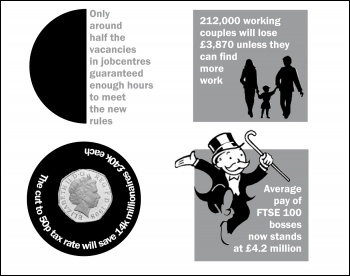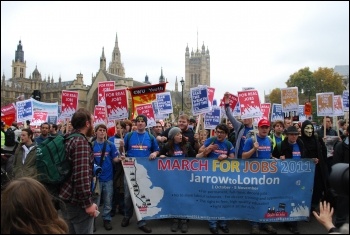Another reason to fight the Con-Dems!
Elaine Brunskill, Trade Unionist and Socialist Coalition candidate for High Fell ward, Gateshead
Class anger has been notched up by the brutal attack on the working tax credit, which is yet another body blow from this rotten Con-Dem government. This is a government which is intent on making the working class and their struggling families pay for capitalism's crisis.
The Institute of Fiscal Studies has calculated that from the start of the new financial year more than 850,000 families will lose all their child tax credit, worth at least £545. Families on the lowest incomes will be hardest hit.
Also, up to 212,000 working couples (with a total of 470,000 children between them) who earn less than £17,000 a year will loseall their working tax credit, worth up to £3,870, unless they can increase their weekly working hours from 16 to 24.
In Austerity Britain, at a time when hours are being cut and workers laid off, how can low paid workers be expected to increase their hours to retain tax credits? A Guardian report which looked at 112,000 vacancies in job centres found that only 52% guaranteed enough hours to meet the new tax credit rules.
Moreover, research by the TUC shows that 1.3 million part-timers are seeking full-time work, the shop workers' union USDAW says that 78% of its part-timers can't get extra hours. It is all very well the TUC and trade unions telling us how bad things are - what they need to do is set up a mass campaign against these attacks on their members.
The Con-Dems are attempting to dress up changes to the welfare system as a way of encouraging the unemployed into work. However, these draconian cuts to tax credits will only affect those already working, making life even harder.
Charities are giving blunt warnings how low income working families will be battered by these changes. Even before these blows take effect Barnado's, the children's charity, shows that six out of ten children who live below the poverty line are in households where someone works.
A recent poll conducted by Netmums found that one in five mothers regularly missed a meal so their children could eat. Undoubtedly, this will include mothers from low-income working families.
Channel your anger!
Yet while ordinary families are suffering, the fat cats and their families are creaming it in. The cut in the 50p tax rate has saved 14,000 millionaires £40,000 each.
The average pay of a FTSE 100 boss now stands at £4.2 million. Then there's the £120 billion a year in tax avoidance, mainly by the rich, which has been highlighted by the PCS. Collecting this, for example, would make all cuts unnecessary.
That's why Trade Unionist and Socialist Coalition (TUSC) candidates are standing for a socialist alternative in order to stop cuts and positively transform the lives of the 99%. How we use the wealth in society should be planned to meet the needs of the overwhelming majority, not obscene profits for a few.
Don't let this anger we feel go to waste - let's put pressure on our trade union leaders to mobilise the strength of the millions-strong workers' movement to fight back.



